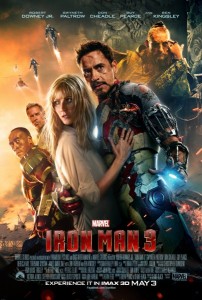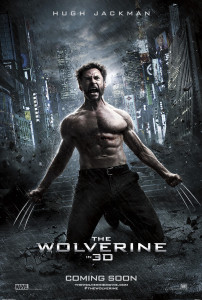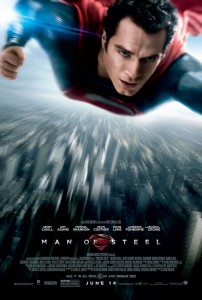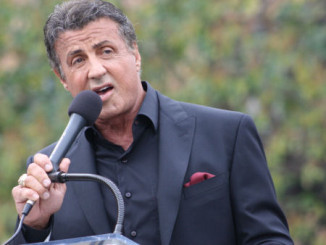 This year, I noticed a marked reduction in the “The Comic Book Film Must Go” articles. Certainly there was still griping, but no longer were there broadsides in the form of feature articles, but rather spitballs flung from the body of a film review. I think this is because the comic book film has become a steady institution. No genre is guaranteed permanence–the western was once the biggest genre in the land and now it’s nowhere to be found in today’s cineplexes–but the comic book movies has settled into a steady groove where each year the blockbusters make a billion dollars, and the flops are few and far between. In other words, the comic book film isn’t going anywhere.
This year, I noticed a marked reduction in the “The Comic Book Film Must Go” articles. Certainly there was still griping, but no longer were there broadsides in the form of feature articles, but rather spitballs flung from the body of a film review. I think this is because the comic book film has become a steady institution. No genre is guaranteed permanence–the western was once the biggest genre in the land and now it’s nowhere to be found in today’s cineplexes–but the comic book movies has settled into a steady groove where each year the blockbusters make a billion dollars, and the flops are few and far between. In other words, the comic book film isn’t going anywhere.
 This year’s billion dollar baby was Iron Man 3. The film received a bump in interest by being the first Marvel film to be released after The Avengers, which led it to gross $1. 2 billion dollars worldwide. That’s double the grosses of Iron Man 2 and only $300,000 shy of The Avengers $1.5 billion, a surprising take for a third installment of a franchise. It was a fortunate turn of events for Robert Downey Jr., as it was the last film of his contract. The actor was quickly signed for two more Avengers films. I bet a lot of professional athletes would like to have a contract year like the one Downey had.
This year’s billion dollar baby was Iron Man 3. The film received a bump in interest by being the first Marvel film to be released after The Avengers, which led it to gross $1. 2 billion dollars worldwide. That’s double the grosses of Iron Man 2 and only $300,000 shy of The Avengers $1.5 billion, a surprising take for a third installment of a franchise. It was a fortunate turn of events for Robert Downey Jr., as it was the last film of his contract. The actor was quickly signed for two more Avengers films. I bet a lot of professional athletes would like to have a contract year like the one Downey had.
 Iron Man’s Avengers teammate Thor also was a beneficiary of an Avengers bump. Thor: The Dark World is, as of this writing, at a little under $628 million dollars worldwide in just 48 days of release. That’s about $180 million more than Thor made IN ITS ENTIRE 112 DAY RUN! And it’s still in over 1,100 theaters, so that number will just grow.
Iron Man’s Avengers teammate Thor also was a beneficiary of an Avengers bump. Thor: The Dark World is, as of this writing, at a little under $628 million dollars worldwide in just 48 days of release. That’s about $180 million more than Thor made IN ITS ENTIRE 112 DAY RUN! And it’s still in over 1,100 theaters, so that number will just grow.
While the Marvel films have shown a great improvement in grosses over the originals, the quality of the films has decreased dramatically. In my opinion, Iron Man 3 was less an Iron Man film than “The Adventures of Tony Stark, Amateur Detective.” He spent precious little time in the armor, spending most of the movie tracking down leads to solve the film’s main conflict. The character showed no aptitude for detective work in any of his previous films, and the change in direction seem just an idea to have the film play more into writer/director Shane Black’s wheelhouse. And Thor: The Dark World suffered from having too little plot for too many characters. The villain Malekith was poorly developed with no notable personality, and most of the supporting cast were given maybe one moment to shine before being shuffled back into the deck as another supporting character got their time in the sun.
Don’t get me wrong, these were flaws in otherwise enjoyable films. However, the Phase I of the Marvel Film Universe did not have as glaring flaws. With the little known Guardians of the Galaxy as one of Marvel’s features next year (joining the sequel Captain America: The Winter Soldier), the studio needs to bring its A-game. Guardians might not survive such missteps as well as these two films did.
 Another Marvel franchise went in the opposite direction on the grosses vs. quality scale. The Wolverine made about $30 million less domestically than its predecessor, X-Men Origins: Wolverine did, but the film was a vast improvement in quality. That’s even with the jarring break in tone of the film’s third act, where it broke down into a round of your typical superhero fisticuffs. But the first two-thirds told a great story and the narrative held through to the end of the film, some thing the last film didn’t have going for it.
Another Marvel franchise went in the opposite direction on the grosses vs. quality scale. The Wolverine made about $30 million less domestically than its predecessor, X-Men Origins: Wolverine did, but the film was a vast improvement in quality. That’s even with the jarring break in tone of the film’s third act, where it broke down into a round of your typical superhero fisticuffs. But the first two-thirds told a great story and the narrative held through to the end of the film, some thing the last film didn’t have going for it.
The film also marked a new trend in comic book films. Every other studio is following in Marvel’s lead and creating a shared universe with their properties. The Wolverine had a mid-credits scene that set up next year’s X-Men: Days of Future Past, which will, in turn, lead directly into 2016’s X-Men: Apocalypse. This is both a sign that studios are investing a lot in the future popularity of the comic book film, but it also is a dangerous plan, as not every license can lend itself to a shared universe as the Avengers and X-Men can.
 2013 also marked the year that many DC Comics fans have been waiting for. It marked the return of Superman as a viable film franchise. Man of Steel was a hard reboot of the property and it scored big time for Warner Brothers, earning over $662 million worldwide. The darker take on the was not a hit with everyone–longtime fans were vocal about how the hero now had a callous disregard to property damage and loss of life–but the grosses were strong enough for Warners to jump start its own shared universe with 2015’s Batman vs. Superman.
2013 also marked the year that many DC Comics fans have been waiting for. It marked the return of Superman as a viable film franchise. Man of Steel was a hard reboot of the property and it scored big time for Warner Brothers, earning over $662 million worldwide. The darker take on the was not a hit with everyone–longtime fans were vocal about how the hero now had a callous disregard to property damage and loss of life–but the grosses were strong enough for Warners to jump start its own shared universe with 2015’s Batman vs. Superman.
However, any optimism DC fans might have has to be tempered with the fact that Warners is rushing in order to play catch-up with Marvel. Not only does Batman vs. Superman reintroduce Batman to the film universe (in the person of the greatly lambasted Ben Affleck), but will introduce Wonder Woman, as portrayed by Gal Gadot, to the film world for the first time. And rumor has it that even more DC heroes, everyone from Flash to Nightwing to Martian Manhunter, might also be appearing in the film. Add that to the rumor that there will be at least two villains and numerous members of the characters’ supporting cast in the film as well, you have a movie that is top loaded with more roles that a plot could conceivably justify. If Thor: The Dark World had more characters than it knew what to do with, how can we expect Batman vs. Superman to be any different. And since the film is going to be a machine designed to launch a DC film universe, it can’t afford to have any characters lost in the shuffle.
Marvel has provided Disney with at least four great franchises to add money to the coffers. But DC has a greater wealth of recognizable characters. It’s no surprise that Warners wants to exploit that. But Marvel built these franchises up slowly over years and years. Warners’ impatience with their properties might just cost them.
 If you were to look at just the domestic grosses, Oblivion ($89,107,235 domestic gross/$120 million budget), Red 2 ($53,262,560 domestic gross/$84 million budget), 2 Guns ($75,612,460 domestic gross/$61 million budget), and Kick-Ass 2 ( $28,795,985 domestic gross/$28 million budget) would all be flops. Okay, 2 Guns would be a disappointment, the rest definitely be flops. But if the sign of a film’s success is doubling its budget, when you add international grosses into the tally, these films were modest to respectable hits.
If you were to look at just the domestic grosses, Oblivion ($89,107,235 domestic gross/$120 million budget), Red 2 ($53,262,560 domestic gross/$84 million budget), 2 Guns ($75,612,460 domestic gross/$61 million budget), and Kick-Ass 2 ( $28,795,985 domestic gross/$28 million budget) would all be flops. Okay, 2 Guns would be a disappointment, the rest definitely be flops. But if the sign of a film’s success is doubling its budget, when you add international grosses into the tally, these films were modest to respectable hits.
Oblivion made $286,168,572 and 2 Guns made $131,940,411 worldwide, more than doubling their budget. Kick-Ass 2 made $59,556,104 worldwide, which also doubles its budget. Red 2 did miss doubling its budget with a disappointing $142,078,971 worldwide, but home video and on demand might be enough to put it over as a hit.
This goes to show why the comic book film has such longevity–they absolutely kill overseas. Iron Man 3, Thor: The Dark World and Man of Steel all made well more than half their worldwide grosses overseas. The Wolverine did too, and it’s worldwide grosses gave it the bump over X-Men Origins: Wolverine in total earnings. So, if you were wondering why Tony Stark had his heart operated on by a Chinese surgeon, or why most of the Thor cast is from the UK or why Logan would spend an entire film in Japan, well, now you know.
 Of course, catering to the foreign markets doesn’t always pay off. A prime example of this is Bullet to the Head. The Sylvester Stallone film was based on a French graphic novel, and replaced the American Thomas Jane with the Asian-American Sung Kang in an attempt to appeal to the Asian market. It didn’t. The $55 million film only earned $22 million worldwide. And that’s with a domestic gross of just under $9.5 million domestically. Ouch.
Of course, catering to the foreign markets doesn’t always pay off. A prime example of this is Bullet to the Head. The Sylvester Stallone film was based on a French graphic novel, and replaced the American Thomas Jane with the Asian-American Sung Kang in an attempt to appeal to the Asian market. It didn’t. The $55 million film only earned $22 million worldwide. And that’s with a domestic gross of just under $9.5 million domestically. Ouch.
 And can we officially dub Ryan Reynolds “Mr. Kiss of Death” for the comic book film? Or, if that is too harsh, “Mr. Bad Luck?” He certainly has appeared in a lot of comic book films and all that he’s starred in has experienced problems.
And can we officially dub Ryan Reynolds “Mr. Kiss of Death” for the comic book film? Or, if that is too harsh, “Mr. Bad Luck?” He certainly has appeared in a lot of comic book films and all that he’s starred in has experienced problems.
First off is Blade: Trinity, in which he played Hannibal King. That film didn’t just kill the successful franchise dead, it failed to spawn a spin-off starring Reynolds’ character and alienated Wesley Snipes so much he sued the producers in lieu of coming back. Next was the aforementioned X-Men Origins: Wolverine, where Reynolds played Wade Wilson/Deadpool. Granted, Reynolds only played a small part in the film, and it was a box office success but it was a fairly awful movie.
He then moved on to the lead with the joyless Green Lantern, a film whose $219 million worldwide gross would have made it a hit—if it didn’t cost $200 million to make.
Finally, he hit screens this year with the Dark Horse comics adaptation R.I.P.D.. The $130 million film only made $78 million worldwide and opened to absolutely dismal reviews.
Of course, Reynolds can not be held wholly responsible for the bad mojo surrounding these films, but there has to be something there. Fox seems to be fast-tracking a lot of X-Men spin-offs. If the long rumored Deadpool actually sees the light of day, perhaps Fox would be better suited if they simply lost Reynolds’ phone number.
As for where the comic book films go from here, well, a busy 2014 will lead into an even busier 2015. We already mentioned that Captain America: The Winter Soldier, Guardians of the Galaxy, and X-Men: Days of Future Past will be headed our way. 300: Rise of an Empire and Sin City: A Dame to Kill For, both of which that were originally scheduled for 2013, will finally be hitting theaters barring any more delays. The Amazing Spider-Man 2 will be continuing the reboot of that franchise and set the stage for more shared universe building, and the controversial reboot of the Teenage Mutant Ninja Turtles film franchise is set to hit theaters in August. The year starts off in a couple of weeks with the adaptation of I, Frankenstein.
And 2015 is looking like it might be a genre movie heaven. In the comic book field alone you’ll have The Avengers: Age of Ultron and Batman vs. Superman, a reboot of the Fantastic Four franchise, the start of Marvel’s Phase III with Ant-Man and an adaptation of Mark Millar’s The Secret Service. If there’s going to be a decline in the comic book film, it will be at least two years away.





STATE OF THE COMIC BOOK FILM: A Juggernaut In Motion http://t.co/J62VFLUoC1
Rich Drees liked this on Facebook.
April Korin liked this on Facebook.